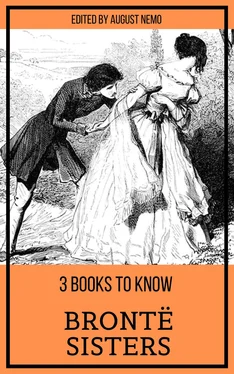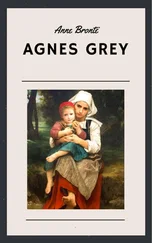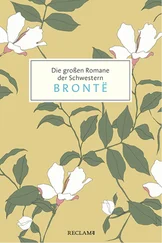Rose and I looked at each other.
‘I don’t know what to make of her at all,’ whispered Rose.
The child looked at her in grave surprise. She straightway began to talk to him on indifferent matters, while I amused myself with looking at the pictures. There was one in an obscure corner that I had not before observed. It was a little child, seated on the grass with its lap full of flowers. The tiny features and large blue eyes, smiling through a shock of light brown curls, shaken over the forehead as it bent above its treasure, bore sufficient resemblance to those of the young gentleman before me to proclaim it a portrait of Arthur Graham in his early infancy.
In taking this up to bring it to the light, I discovered another behind it, with its face to the wall. I ventured to take that up too. It was the portrait of a gentleman in the full prime of youthful manhood—handsome enough, and not badly executed; but if done by the same hand as the others, it was evidently some years before; for there was far more careful minuteness of detail, and less of that freshness of colouring and freedom of handling that delighted and surprised me in them. Nevertheless, I surveyed it with considerable interest. There was a certain individuality in the features and expression that stamped it, at once, a successful likeness. The bright blue eyes regarded the spectator with a kind of lurking drollery—you almost expected to see them wink; the lips—a little too voluptuously full—seemed ready to break into a smile; the warmly-tinted cheeks were embellished with a luxuriant growth of reddish whiskers; while the bright chestnut hair, clustering in abundant, wavy curls, trespassed too much upon the forehead, and seemed to intimate that the owner thereof was prouder of his beauty than his intellect—as, perhaps, he had reason to be; and yet he looked no fool.
I had not had the portrait in my hands two minutes before the fair artist returned.
‘Only some one come about the pictures,’ said she, in apology for her abrupt departure: ‘I told him to wait.’
‘I fear it will be considered an act of impertinence,’ I said ‘to presume to look at a picture that the artist has turned to the wall; but may I ask—’
‘It is an act of very great impertinence, sir; and therefore I beg you will ask nothing about it, for your curiosity will not be gratified,’ replied she, attempting to cover the tartness of her rebuke with a smile; but I could see, by her flushed cheek and kindling eye, that she was seriously annoyed.
‘I was only going to ask if you had painted it yourself,’ said I, sulkily resigning the picture into her hands; for without a grain of ceremony she took it from me; and quickly restoring it to the dark corner, with its face to the wall, placed the other against it as before, and then turned to me and laughed.
But I was in no humour for jesting. I carelessly turned to the window, and stood looking out upon the desolate garden, leaving her to talk to Rose for a minute or two; and then, telling my sister it was time to go, shook hands with the little gentleman, coolly bowed to the lady, and moved towards the door. But, having bid adieu to Rose, Mrs. Graham presented her hand to me, saying, with a soft voice, and by no means a disagreeable smile,—‘Let not the sun go down upon your wrath, Mr. Markham. I’m sorry I offended you by my abruptness.’
When a lady condescends to apologise, there is no keeping one’s anger, of course; so we parted good friends for once; and this time I squeezed her hand with a cordial, not a spiteful pressure.
––––––––

DURING THE NEXT FOUR months I did not enter Mrs. Graham’s house, nor she mine; but still the ladies continued to talk about her, and still our acquaintance continued, though slowly, to advance. As for their talk, I paid but little attention to that (when it related to the fair hermit, I mean), and the only information I derived from it was, that one fine frosty day she had ventured to take her little boy as far as the vicarage, and that, unfortunately, nobody was at home but Miss Millward; nevertheless, she had sat a long time, and, by all accounts, they had found a good deal to say to each other, and parted with a mutual desire to meet again. But Mary liked children, and fond mammas like those who can duly appreciate their treasures.
But sometimes I saw her myself, not only when she came to church, but when she was out on the hills with her son, whether taking a long, purpose-like walk, or—on special fine days—leisurely rambling over the moor or the bleak pasture-lands, surrounding the old hall, herself with a book in her hand, her son gambolling about her; and, on any of these occasions, when I caught sight of her in my solitary walks or rides, or while following my agricultural pursuits, I generally contrived to meet or overtake her, for I rather liked to see Mrs. Graham, and to talk to her, and I decidedly liked to talk to her little companion, whom, when once the ice of his shyness was fairly broken, I found to be a very amiable, intelligent, and entertaining little fellow; and we soon became excellent friends—how much to the gratification of his mamma I cannot undertake to say. I suspected at first that she was desirous of throwing cold water on this growing intimacy—to quench, as it were, the kindling flame of our friendship—but discovering, at length, in spite of her prejudice against me, that I was perfectly harmless, and even well-intentioned, and that, between myself and my dog, her son derived a great deal of pleasure from the acquaintance that he would not otherwise have known, she ceased to object, and even welcomed my coming with a smile.
As for Arthur, he would shout his welcome from afar, and run to meet me fifty yards from his mother’s side. If I happened to be on horseback he was sure to get a canter or a gallop; or, if there was one of the draught horses within an available distance, he was treated to a steady ride upon that, which served his turn almost as well; but his mother would always follow and trudge beside him—not so much, I believe, to ensure his safe conduct, as to see that I instilled no objectionable notions into his infant mind, for she was ever on the watch, and never would allow him to be taken out of her sight. What pleased her best of all was to see him romping and racing with Sancho, while I walked by her side—not, I fear, for love of my company (though I sometimes deluded myself with that idea), so much as for the delight she took in seeing her son thus happily engaged in the enjoyment of those active sports so invigorating to his tender frame, yet so seldom exercised for want of playmates suited to his years: and, perhaps, her pleasure was sweetened not a little by the fact of my being with her instead of with him, and therefore incapable of doing him any injury directly or indirectly, designedly or otherwise, small thanks to her for that same.
But sometimes, I believe, she really had some little gratification in conversing with me; and one bright February morning, during twenty minutes’ stroll along the moor, she laid aside her usual asperity and reserve, and fairly entered into conversation with me, discoursing with so much eloquence and depth of thought and feeling on a subject happily coinciding with my own ideas, and looking so beautiful withal, that I went home enchanted; and on the way (morally) started to find myself thinking that, after all, it would, perhaps, be better to spend one’s days with such a woman than with Eliza Millward; and then I (figuratively) blushed for my inconstancy.
On entering the parlour I found Eliza there with Rose, and no one else. The surprise was not altogether so agreeable as it ought to have been. We chatted together a long time, but I found her rather frivolous, and even a little insipid, compared with the more mature and earnest Mrs. Graham. Alas, for human constancy!
Читать дальше












